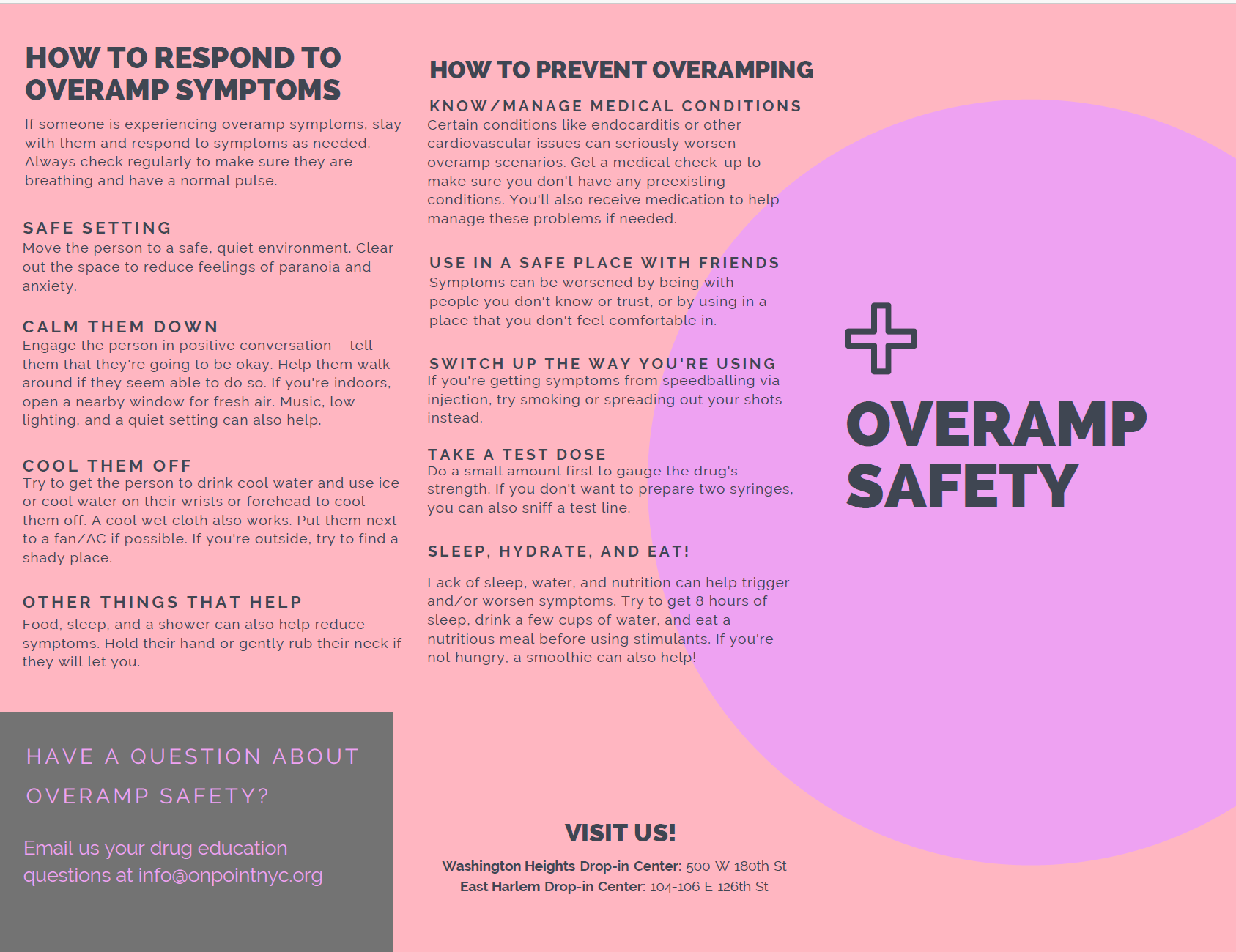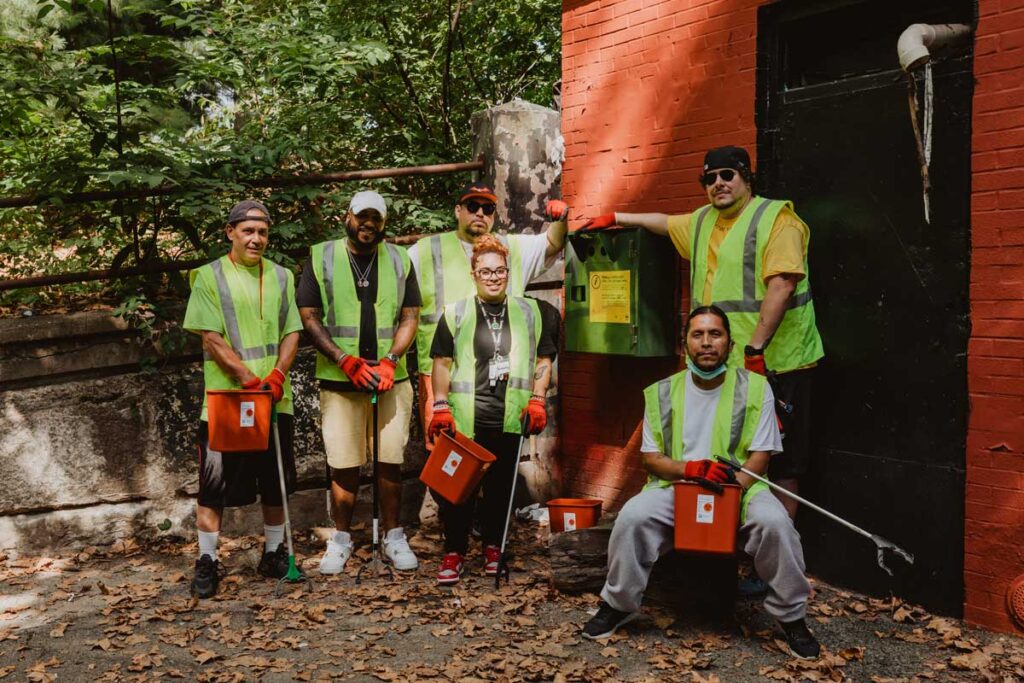
Overamp Safety Guide
How to Respond to Overamp Symptoms
If someone is experiencing overamp symptoms, stay with them and respond to symptoms as needed. Always check regularly to make sure they are breathing and have a normal pulse.
SAFE SETTING
Move the person to a safe, quiet environment. Clear out the space to reduce feelings of paranoia and anxiety.
CALM THEM DOWN
Engage the person in positive conversation– tell them that they’re going to be okay. Help them walk around if they seem able to do so. If you’re indoors, open a nearby window for fresh air. Music, low lighting, and a quiet setting can also help.
COOL THEM OFF
Try to get the person to drink cool water and use ice or cool water on their wrists or forehead to cool them off. A cool wet cloth also works. Put them next to a fan/AC if possible. If you’re outside, try to find a shady place.
OTHER THINGS THAT HELP
Food, sleep, and a shower can also help reduce symptoms. Hold their hand or gently rub their neck if they will let you.
HOW TO PREVENT OVERAMPING
KNOW/MANAGE MEDICAL CONDITIONS
Certain conditions like endocarditis or other cardiovascular issues can seriously worsen overamp scenarios. Get a medical check-up to make sure you don’t have any preexisting conditions. You’ll also receive medication to help manage these problems if needed.
USE IN A SAFE PLACE WITH FRIENDS
Symptoms can be worsened by being with people you don’t know or trust, or by using in a place that you don’t feel comfortable in.
SWITCH UP THE WAY YOU’RE USING
If you’re getting symptoms from speedballing via injection, try smoking or spreading out your shots instead.
TAKE A TEST DOSE
Do a small amount first to gauge the drug’s strength. If you don’t want to prepare two syringes, you can also sniff a test line.
SLEEP, HYDRATE, AND EAT!
Lack of sleep, water, and nutrition can help trigger and/or worsen symptoms. Try to get 8 hours of sleep, drink a few cups of water, and eat a nutritious meal before using stimulants. If you’re not hungry, a smoothie can also help!
WHAT IS OVERAMPING?
- Overamping is any physical or psychological effect that negatively impacts or endangers an individual due to taking stimulants (e.g., crack or powder cocaine, crystal meth, amphetamines).
- Unlike overdose, overamping isn’t necessarily a medical emergency but can just be unpleasant.
WHAT ARE COMMON OVERAMP SIGNS?
- Physical: fast heart rate/pulse, high body temperature/overheating, sweating, chills, irregular breathing, passing out, chest pain/tightening, nausea/vomiting, seizure, jerking or rigid limbs, headache, increased blood pressure, teeth grinding, convulsions, and/or tremors.
- Psychological: extreme anxiety, panic, hypervigilance, extreme agitation/paranoia, hallucinations, feeling paralyzed while awake, insomnia, delusions, suicidal thoughts, and/or extreme behaviors.
WHEN IS OVERAMPING A MEDICAL PROBLEM?
STROKE
SYMPTOMS
Sudden numbness (especially on one side of the body), trouble speaking or understanding speech, trouble seeing or walking, dizziness, sudden severe headache, uneven facial features.
RESPONSE
Always call 911 if you suspect someone is having a stroke!
HEART ATTACK
SYMPTOMS
Very fast/irregular pulse, chest pain/tightness, shortness of breath, discomfort in other areas of the upper body, drenching sweat, nausea/vomiting, cold/clammy limbs.
RESPONSE
Always call 911 if you suspect someone is having a heart attack!
SEVERE OVERHEATING AND HEAT STROKE
SYMPTOMS
Nausea/vomiting, headache, dizziness, fatigue, hot and flushed skin, rapid heart rate, dry skin, not sweating.headache, uneven facial features.
RESPONSE
1) See "Cool them off" (previous section) for tips.
2)Call 911 if: the person is unconscious or showing signs of confusion.
SEIZURE
SYMPTOMS
Loss of consciousness or awareness, feeling "fuzzy" or confused, tingling/numbness, forgetfulness, falling, blank stares, convulsions, spasms.
RESPONSE
1) Don't restrain the person or put anything in their mouth-- let the spasm happen.
2) If possible, place something soft under their head to protect their head and neck.
3) Loosen anything around the person's neck (e.g., tie, collar, jewelry).
4) Clear the area of any hard/sharp objects to help prevent injury.
5) Stay with them and monitor seizure duration.
6) Call 911 if:
1) the seizure lasts more than 2 minutes,
2) the person is having difficulty breathing/waking up afterward,
3) the person was hurt during the seizure, or
4) the person had a second seizure after the first ended.
AFTER THE SEIZURE
Help them lay in a safe place and, once they're able to speak and understand you, calmly explain to them that they just had a seizure. If the person wants to leave, call a taxi or have someone go with them.
PSYCHOLOGICAL/ BEHAVIORAL EMERGENCIES
Overamping can cause shock and/or psychosis, which can be traumatic for an individual. In these cases, the person is not in control and so might put themselves or others into dangerous situations.
SYMPTOMS
Delusions, hallucinations, paranoia, suicidal thoughts/behavior, erratic behavior, anxiety, obsessive thinking, disorganized thoughts
RESPONSE
1) Carefully direct them to a safe, quiet place.
2) See "Calm them down" and "Other things that help" on opposite page for more tips.
3) Call 911 if:
1) you believe the person may cause harm to themselves or others,
2) if the person is acting strangely in public and you are concerned someone else may see them as a danger- it's always better to call 911 yourself so you can be in control of the situation!
Have a Question about Overamp Safety?
Email us your drug education questions at [email protected]
Visit Us
Locations
East Harlem
104 -106 E 126th Street
New York, NY 10035
Washington Heights
500 W 180th Street
New York, NY 10033
Email: [email protected]
Phone: (212) 828-8464
Drop-in Centers Hours
Washington Heights DIC
Monday – Friday: 7:30 AM – 11 PM
Weekends: 9 AM – 4:30 PM
East Harlem DIC
Monday – Friday: 7:30 AM – 11PM
Weekends: 10:30 AM – 6 PM
